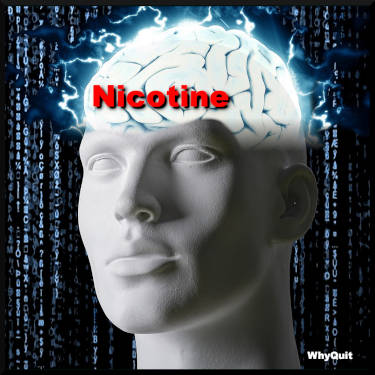
Brains of 20-year ex-smokers primed for smoking relapse
The Law of Addiction states, "Administration of a drug to an addict will cause re-establishment of chemical dependence upon the addictive substance." No known cure, on lifetime probation once free, just one puff away from relapse, if true, why?
While millions of lost long-term quits serve as powerful empirical evidence that, once established, nicotine addiction is as permanent as alcoholism, actual evidence of permanent brain alterations has been limited.

A new study published in the March edition of Scientific Reports documents neurobiological brain changes that may account for ex-smokers remaining vulnerable to relapse decades after quitting.
Entitled "Persistent impacts of smoking on resting-state EEG in male chronic smokers and past-smokers with 20 years of abstinence," researchers used electroencephalography to compare the brain waves of 20 heavy smokers who smoked daily for at least 20 years, to 28 ex-smokers who successfully quit for at least 20 years, and 33 non-smoking controls (never-smokers).
A cross-sectional study of males only -- leaving open questions of causation and the possibility of different female findings – researchers found that both current-smokers and ex-smokers showed "significantly decreased relative theta power than never-smokers," suggesting persistent long-term effects of smoking on the brain.
According to a 2019 study, "theta power is a brain oscillation ranging from 4 to 7 Hz that has been linked to cognitive and memory performance."
In discussing the new study's findings, the authors note, "Our data show that the EEG biomarkers in chronic smokers can also be observed at a significant level in past-smokers with more than 20 years of sustained remission, which suggests long-lasting and potentially irreversible impacts of smoking."
This isn't the first study to suggest permanent structural brain changes in smokers. A 2006 study found that "current smokers and former smokers exhibited significantly diminished P300 amplitudes (Cz, Pz) relative to never smokers," evidence of "dysfunctional activation of frontal lobe networks."
While it may take decades to fully unravel why, once free, one puff is too many and thousands not enough, it doesn't take rocket science to appreciate that the opposite is true, that it it is IMPOSSIBLE to relapse so long as all nicotine stays on the outside.
#NicotineFree2023 Yes you can!
 John R. Polito received his JD from the University of South Carolina School of Law in 1985, where he graduated Wig & Robe. He is a former 3-pack-a-day thirty-year smoker and the 1999 founder of WhyQuit. A nicotine cessation educator since 2000, John mentored under Joel Spitzer for two decades, presenting more than 100 live nicotine dependency recovery programs modeled after Joel's programs. He is the author of "Freedom from Nicotine - The Journey Home," "Smart Turkey," 6 peer-reviewed journal articles, and founder and director of Turkeyville, a 15,000-member Facebook support group exclusively for cold turkey quitters. Email: johnpolito54@gmail.com
John R. Polito received his JD from the University of South Carolina School of Law in 1985, where he graduated Wig & Robe. He is a former 3-pack-a-day thirty-year smoker and the 1999 founder of WhyQuit. A nicotine cessation educator since 2000, John mentored under Joel Spitzer for two decades, presenting more than 100 live nicotine dependency recovery programs modeled after Joel's programs. He is the author of "Freedom from Nicotine - The Journey Home," "Smart Turkey," 6 peer-reviewed journal articles, and founder and director of Turkeyville, a 15,000-member Facebook support group exclusively for cold turkey quitters. Email: johnpolito54@gmail.com

